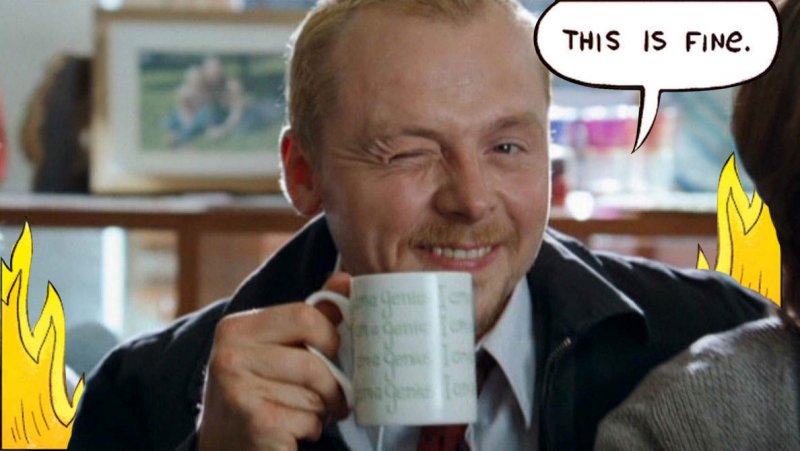
You’ve probably seen the comic strip. A cartoon dog, a little peanut hat perched on his domed head, sits at a table, smiling to himself and drinking coffee. The room is burning down around him. “This is fine,” he says. You might not have seen the next four panels, but the little guy continues, “I’m okay with the events that are currently unfolding. That’s okay, things are going to be okay.”
His face melts in the flames.

The comic strip was created by artist KC Green all the way back in January 2013, and, according to Know Your Meme, went viral when it was posted on Reddit in September 2014. Since then, it’s only increased in popularity – helped in no small part by the bizarre, catastrophic trajectory of world politics over the last three years.
Searches for the meme peaked in the summer of 2016, and on the day of President Trump’s inauguration – a few days later a video game version of the comic was released. This week, it was even used in a protest sign against Donald Trump’s visa ban. It’s become a shortcut to one of the questions of our time – how do you keep living your normal life as the world seems to crash and burn around you?
It’s a very human response to crisis, one that keeps popping up on the small screen. Instead of the screaming, shocked bystander, dark, post-apocalyptic comedies are finding the humour in protagonists who plough on in the face of extreme and surreal disaster.
It’s not an entirely new phenomenon: we can trace this strain of humour back to moments in Dr Strangelove or: How I Learned to Stop Worrying and Love The Bomb, Radioactive Dreams and even Shaun of the Dead (there’s a lot of screaming, yes, but Shaun eventually achieves his fantasy of waiting for the whole thing to blow over).

But denial in the face of disaster is on the rise. The 2015 TV series The Last Man on Earth followed Phil Miller, seemingly the only human survivor after a deadly virus wiped out the earth’s population in 2019. The trailer focused on the idea that despite the eradication of the human race, Miller would keep up with the mundane activities of his former life – picking up whatever he wants from well-stocked supermarkets (including porn magazines), going to art galleries (and getting peanut butter on the artwork), even karaoke (in the somewhat more outlandish form of singing the national anthem to an empty football stadium through a megaphone).
2016’s television comedy The Good Place stars Kristen Bell as a recently deceased young woman named Eleanor. The New Yorker TV critic Emily Nussbaum wrote that the show (the finale of which aired the night before Trump’s election), is “uncomfortably appropriate for our apocalyptic era”.
The first episode begins with Elizabeth opening her eyes to find herself in a nondescript room sitting on an off-white couch. The wall opposite her bears a slogan in bright green: “Welcome! Everything is fine.”

She smiles. She’s invited into the office of a tall stranger (Ted Danson). “Hi Eleanor, I’m Michael,” he tells her. “How are you today?”
“I’m great,” she enthuses. “Thanks for asking. Oh, one question: who are you and what’s going on?”
“Right, so. You, Eleanor Shellstrop, are dead. Your life on earth has ended, and you’re now in the next phase of your existence in the universe.”
A beat passes. “Cool!” she says, with a not-quite-convincing smile. “Cool…”
This January, Netflix released eight episodes of A Series of Unfortunate Events, a show that is unafraid of announcing that the world is, in fact, not fine at all, but so terribly morbid and traumatic that you should look away, if you have the chance. But much of its comedy is found in the dim-witted (if occasionally well-meaning) adults who refuse to hear or understand the severity of the situations the Baudelaire orphans all-too-frequently find themselves in.
“I have some very bad news for you children,” their temporary guardian Mr Poe tells them. “Your parents have perished in a terrible fire.” Barely pausing to allow the children to process the information, he continues “I just want to assure you Baudelaires that you have absolutely nothing… to worry about.”
In the A Series of Unfortunate Events world, the surest sign of danger is a person in a position of authority insisting that everything is fine, and there’s nothing to worry about.
And there’s more to come. A new offering from Netflix will drop this Friday – Santa Clarita Diet, starring Drew Barrymore as a woman who seems to turn into a zombie overnight, overcome by the desire to follow her impulses… and eat people. The comedy of the show revolves around Barrymore’s character’s insistence that she’s fine – she feels better than ever, in fact.
Her husband (Timothy Olyphant), too, seems happy enough going along with the idea that their socially acceptable, middle-class life and suburban marriage can continue as they become serial killers, offering a solid line in gritted-teeth appeasements.
There’s a whole world of television out there to accompany our transition into the fiery hellpit that is 2017. If you need me, I’ll be in the corner, watching hour after hour of post-apocolyptic comedy, laughing to myself. Because this is fine. Yep. I’m okay with the events that are currently unfolding.





